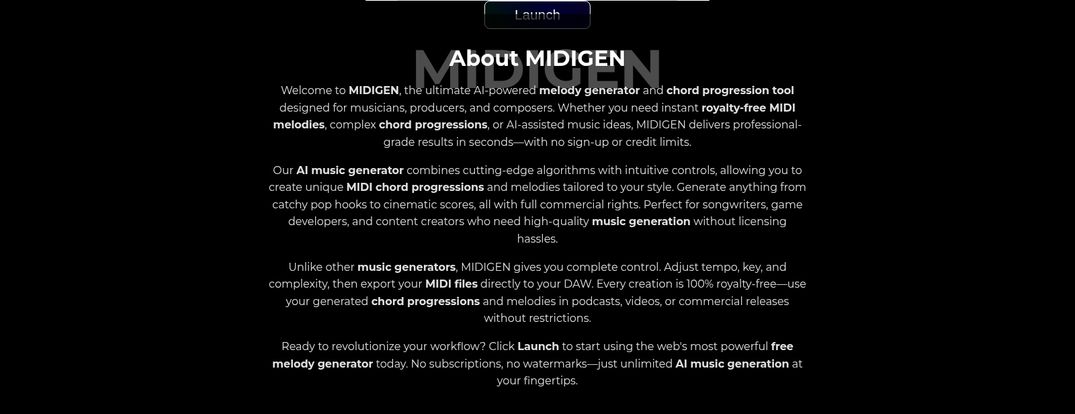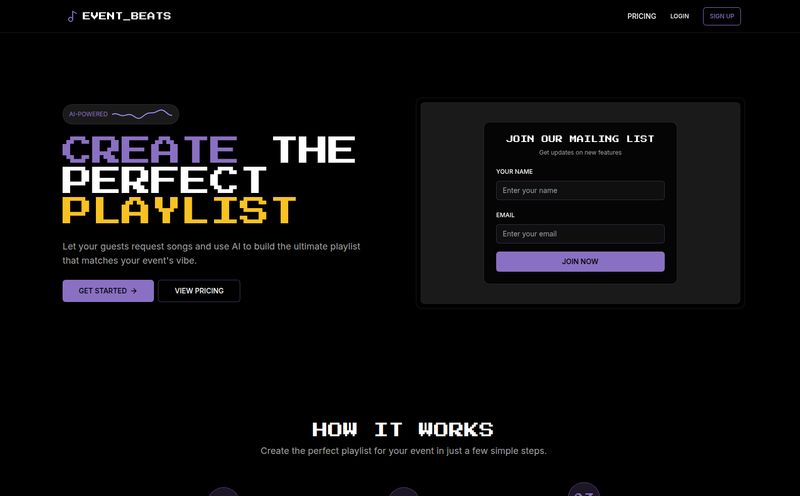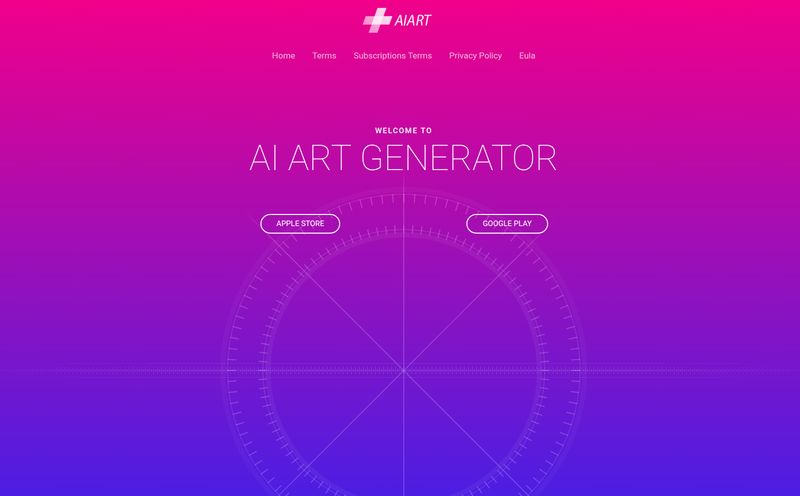We’ve all been there. Staring at the blank piano roll in our DAW, the cursor blinking tauntingly. You’ve got a deadline, or maybe just a burning desire to create, but the well of inspiration has run completely dry. It’s a frustrating place to be, a creative desert where every chord you play sounds like something you’ve written a thousand times before. For years, the solution was to walk away, listen to other music, or just bang your head against the keyboard. Fun times.
But the tech world, in its relentless march forward, has offered up a new solution: AI. Yeah, I know, I know. Another AI tool. Every week there’s a new AI that promises to write your emails, design your house, and probably walk your dog. I’m as skeptical as the next person. But every now and then, something genuinely useful pops up. Something that feels less like a replacement for human creativity and more like a new kind of collaborator.
Enter MIDIGEN. I stumbled across it recently, and its premise is deceptively simple: it’s an AI-powered melody and chord progression generator. It doesn’t try to be a full-blown production suite. It does one thing: it gives you MIDI. And honestly? That’s why it’s so brilliant.
So, What's the Big Deal with MIDIGEN?
At its core, MIDIGEN is a web-based tool designed to spit out unique, royalty-free MIDI melodies and chord progressions on demand. You don’t need to sign up, there are no credit limits, and there are no sneaky watermarks. You just… go to the site and start creating. It feels almost suspiciously simple in an age where everything wants your email and a monthly subscription.
Instead of generating a finished audio file (like an .mp3), it generates a MIDI file. For the non-musicians in the room, think of MIDI as a set of instructions, not a sound. It’s the sheet music, not the orchestra. This is a huge distinction. It means you can take the file MIDIGEN creates, drop it into any Digital Audio Workstation (DAW) like Ableton Live, FL Studio, or Logic Pro, and have complete control. You can change the instrument, edit the notes, tweak the timing—anything you want. It’s less like a vending machine for songs and more like a bag of high-quality, organic ingredients for a chef.

Visit MIDIGEN
Getting Your Hands Dirty: The User Experience
The interface is clean. Almost shockingly so. There aren't a million confusing knobs and sliders. It's built for speed. You’re presented with a few simple parameters to guide the AI:
- Scale: From your standard Major and Minor to more exotic-sounding scales like Dorian, Phrygian, or even the Whole Tone scale. This is great for setting a specific mood right from the get-go.
- Key: All 12 keys are there. Standard stuff, but essential.
- Bars: You can choose how long you want your melody or chord progression to be. Need a quick 4-bar loop? Or a more developed 16-bar phrase? You got it.
- Tempo: Set the speed of your track in BPM (beats per minute).
Once you’ve set your parameters, you hit the magic button, and poof—a melody appears. You can preview it right in the browser with a simple Piano or Synth sound. If you like it, you download the MIDI file. If you don't, you just click again for a new one. It's an endless fountain of ideas. I spent a good 30 minutes just clicking the generate button, seeing what kinds of weird and wonderful things the AI would come up with. It's addicting.
The Good, The Bad, and The Musical
No tool is perfect, right? After playing around with MIDIGEN for a while, I’ve got some thoughts. It’s a tool with a very clear purpose, and it comes with its own set of strengths and weaknesses.
The Bright Side of the Melody
The biggest win here is the royalty-free license. For content creators, YouTubers, or indie game devs, this is a godsend. Finding unique background music that won't get you a copyright strike is a constant struggle. With MIDIGEN, you can generate the skeleton of a track, dress it up in your DAW, and have a completely unique, commercially-usable piece of music. That's huge.
The ease of use is another major plus. You don't need a degree in music theory to get something that sounds good. It's a fantastic starting point for beginners and a powerful brainstorming tool for seasoned pros. Sometimes you just need a little nudge to get the creative juices flowing, and MIDIGEN is a great, non-judgmental nudge.
A Couple of Minor-Key Issues
Okay, it's not all sunshine and perfect cadences. The built-in instrument selection for previewing is, let's say, basic. You get Piano and Synth. That's it. This isn't a deal-breaker, since the whole point is to export the MIDI and use your own sounds, but it would be nice to get a slightly better feel for the melody with a few more options. A guitar or some strings, maybe?
Also, and this is true for almost all generative music tools, the melodies can sometimes lack... human soul. They are musically correct, but they might not have the nuance or emotional arc of a human-composed piece. You’ll probably want to go in and tweak the velocity, add some pauses, and maybe change a few notes to make it truly your own. It gives you a fantastic starting point, but it's not going to compose a symphony for you.
Who Is This Really For?
I see a few groups getting a ton of value out of this.
First, music producers and composers. If you're stuck on a chord progression for a new pop track or need a melodic idea for a film score, this is your tool. It can break you out of your usual patterns and introduce you to ideas you wouldn't have thought of on your own.
Second, content creators and streamers. As I mentioned, the royalty-free aspect is a game-changer. You can literally generate infinite, custom background tracks for your videos or streams. No more scrolling through endless libraries of stock music that everyone else is already using.
Finally, indie game developers. Music is a huge part of a game's atmosphere, but hiring a composer can be expensive. MIDIGEN provides a way to generate thematic ideas or even procedural background music on a shoestring budget.
The All-Important Question of Price
Here's where things get interesting. The site proudly states “no subscriptions, no watermarks, no credit limits.” So… is it free? It appears to be completely free to use right now. I even went looking for a pricing page, and the link seems to be broken, leading to a "Not Found" error. It's a bit of a mystery.
My guess? They're in a launch phase, trying to get users and feedback. It’s possible a “Pro” version with more features could appear down the line. But for now, it's a powerful tool available at the unbeatable price of zero. I’d recommend jumping on it while the getting is good.
A New Instrument in the Orchestra
Look, AI music tools are a dime a dozen these days, and many of them are either too complex or too limiting. MIDIGEN hits a sweet spot. It understands its role. It’s not trying to replace the musician; it’s trying to be a new kind of instrument. A tool for inspiration, a cure for creative block, and a source of infinite, raw musical material.
It's a fantastic example of AI being used to augment human creativity, not automate it away. It still requires a human touch to take its ideas and shape them into something truly special. And for me, that's exactly what a good tool should do. It's definitely earned a spot in my creative toolkit.
Frequently Asked Questions about MIDIGEN
- Is MIDIGEN really free to use?
- As of right now, yes. The website states it's free with no subscriptions or credit limits. It's always a good idea to check their terms, but it currently appears to be completely free.
- Can I use the music I create with MIDIGEN in my commercial projects?
- Yes! The platform generates royalty-free MIDI files, meaning you have full commercial rights to use the creations in your podcasts, videos, games, or even commercial music releases without restrictions.
- What file format does MIDIGEN export?
- It exports standard MIDI files (.mid). These files can be imported into virtually any Digital Audio Workstation (DAW) for further editing and instrument assignment.
- Do I need to be a professional musician to use it?
- Not at all. The interface is very straightforward and easy to use. While musicians will get a lot out of it, even beginners can generate musically coherent ideas with just a few clicks.
- What instruments can I choose from?
- For previewing the melody within the tool itself, the options are limited to Piano and Synth. However, since it exports a MIDI file, you can assign any instrument you own in your personal sound library or DAW to the melody.



